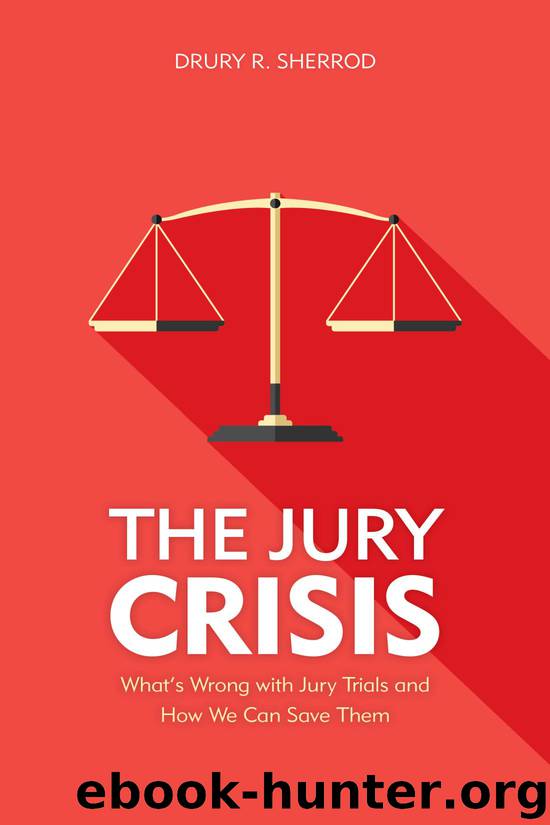The Jury Crisis by Drury R. Sherrod

Author:Drury R. Sherrod
Language: eng
Format: epub
Publisher: Rowman & Littlefield Publishers
Chapter nine
Storytellers in Robes
“Jesus, this is the scariest thing I’ve ever seen.” “I never want to go through this again.” “Why do I even try cases in front of these kinds of people?” Slumped in their chairs, mouths gaping, heads in their hands, attorneys are often shocked when they watch mock jurors deliberate. Viewed through one-way mirrors or on closed-circuit TVs, typical mock-jury deliberations are far removed from the triers-of-fact ideal embodied in the United States Constitution. As shown in the previous chapter, that seeming nugget of irrefutable evidence; the prestigious expert whose testimony was so hard to schedule; the carefully conducted and expensive accident reconstructions, scientific analyses, and economic projections, all might be ignored by jurors in favor of a vaguely relevant example or anecdote from someone’s personal experience. “Surely there must be a better way to obtain a verdict,” attorneys often say with a sigh.
You may be thinking the same thing. “Are jurors really capable of rendering just verdicts?” “Wouldn’t judges, with their law-school degrees, their experience on the bench, and their expertise in making decisions, be better at resolving disputes than laypeople who know nothing about the law, that is, jurors?”
Legalists versus Realists
If you are asking yourselves questions like this, then you are already dipping your toes into a long-standing debate about judges in America. On one side, the legalists maintain that judges follow strict guidelines and precedents. They determine the law as it applies to the facts. They are guided by previous verdicts and court findings. They keep their personal views out of their decisions. In other words, they follow a strictly legal path to reaching a verdict.
On the other side of this debate, the realists reply that judges are people. Like anyone else, judges view the world through lenses colored by political ideology, race, gender, religion, and life experiences. They rely on familiar cognitive shortcuts that can blind them to differing perspectives. They are mindful of how their rulings may help or hinder their career paths to a higher court. When making decisions with a panel of two other judges, as happens at appellate courts, they yield to group pressure and conform to majority opinion. In other words, from a realistic analysis, judges behave just like jurors. Which side is right in this debate? Do judges strictly follow the law in making decisions, or are they influenced by a host of ideological and personal factors when they make rulings or reach verdicts?
The realists—those who argue that judges are just people and not all that different from jurors—point out that judges frequently disagree among themselves when they interpret the law. “If the law is so straightforward,” the realists ask, “so based on codes and precedents, then why would different judges reach different conclusions when they have the same facts?” In this chapter, I show how often judges disagree, what accounts for their disagreements, and whether judges are better than jurors at rendering just verdicts.
When Judges Disagree
To start my analysis of judges reaching different conclusions about the
Download
This site does not store any files on its server. We only index and link to content provided by other sites. Please contact the content providers to delete copyright contents if any and email us, we'll remove relevant links or contents immediately.
Objection! by Nancy Grace(1782)
Apeirogon by Colum McCann(1704)
Anatomy of Injustice by Raymond Bonner(1668)
That Every Man Be Armed by Stephen P. Halbrook(1582)
Civil Procedure (Aspen Casebooks) by Stephen C. Yeazell(1556)
The Vaccine Court by Rohde Wayne(1512)
Injustices by Ian Millhiser(1501)
Storytelling for Lawyers by Meyer Philip(1465)
A Practical Guide to International Arbitration in London by Hilary Heilbron(1440)
Restitution by Restitution(1427)
Coercing Virtue by Robert H. Bork(1359)
Broken Scales by Joel Cohen(1353)
Tangled Webs: How False Statements Are Undermining America: From Martha Stewart to Bernie Madoff by James B. Stewart(1339)
The Tools of Argument: How the Best Lawyers Think, Argue, and Win by Joel Trachtman(1318)
A Matter of Interpretation by Antonin Scalia(1316)
INDEFENSIBLE: One Lawyer's Journey Into the Inferno of American Justice by Feige David(1293)
American Tragedy by Lawrence Schiller & James Willwerth(1275)
A Religious Orgy in Tennessee by H.L. Mencken(1255)
Tangled Webs by James B. Stewart(1248)
